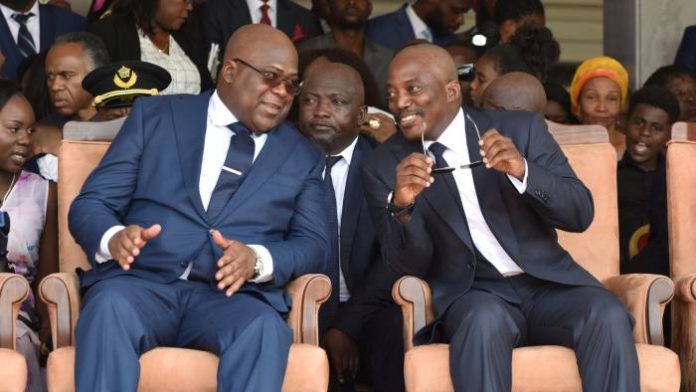FCC will have wide-ranging powers including ability to select next prime minister
Outgoing president Joseph Kabila’s coalition will continue to exert huge influence on the future of the Democratic Republic of Congo after winning a suspect parliamentary election, in which some vote tallies were not even counted, according to three senior Congolese politicians.
Mr Kabila’s Common Front for Congo or FCC will have wide-ranging powers in the new parliament, including the ability to select the next prime minister, influence the appointment of multiple cabinet ministers and even approve constitutional changes.
The FCC also won a majority of seats in provincial assemblies, which will elect governors and senators who, in turn, will probably give the FCC control over who becomes senate president.
The parliamentary election was held on the same day as the presidential vote, which was widely believed to be rigged in favour of new President Felix Tshisekedi. The politicians’ allegations of further political interference pointed to an electoral process that was closely managed by Mr Kabila’s entourage from start to finish.
Even with a tightly controlled race, Mr Kabila was unable to deliver a victory for Emmanuel Shadary, his chosen successor, in the presidential election but in the parliamentary vote his coalition won as many as 350 out of 500 seats in the National Assembly, according to party officials.
“It’s the prime minister that runs the government day to day, and with continued control of the army and the security services, the FCC will not be giving up power,” Samy Badibanga, Congo’s prime minister from 2016 to 2017, told the Financial Times.
While the presidential vote was widely scrutinised, the less-studied parliamentary results were equally alarming and will have greater consequences for the future of the country, according to Mr Badibanga, who ran for president and for a parliamentary seat but lost both races.
“Until today, with regard to the parliamentary elections, we don’t really know what were the results,” Mr Badibanga said. He believes that the ballot papers were never counted in his constituency. “Where do the results come from? They’re imaginary results,” he said.
The electoral commission announced the winners of parliamentary seats but provided no further information and did not publish the number of votes for each candidate.

Voting data in Congo points to mass fraud
In December, voting machines, which sent electronic tallies to a central database, in most cases within 24 to 48 hours, gave a handful of senior election commission officials the results days before anyone else.
The official figures, however, were meant to be calculated from the ballot papers that were printed by the devices, counted by hand in polling stations and then compiled in more than 170 centres around the country.
In many cases this final compilation process was either not completed or did not even start, according to candidates and diplomats. Tallies from the compilation centres have not been published.
Another candidate, a government minister, said he won one of the 14 parliamentary seats available in his constituency but that it was given to someone else, possibly in another party, during the political negotiations that preceded the publication of the results. “I won but my colleagues removed me from the list due to the political arbitrage that needed to take place,” the minister said.
A third candidate, a former governor, said that vote tallies collected by his team showed that he won the parliamentary race in his constituency but the seat was given to another candidate.
The FCC and the electoral commission deny interfering with the results. The FCC said its landslide victory was understandable because it fielded more than 10,000 candidates for parliamentary seats, 20 times more than most opposition parties.
The huge turnout in favour of the ruling party in the parliamentary elections was surprising on a day when at least 70 per cent of voters backed an opposition candidate for president. “There is a logical problem,” Mr Badibanga said. “It’s basically impossible.”
Congo’s election results in 2006 and 2011 were also disputed and the allocation of parliamentary seats is often said to be negotiated. Many politicians see election day as only the first step in a drawn-out process of political arbitration.































